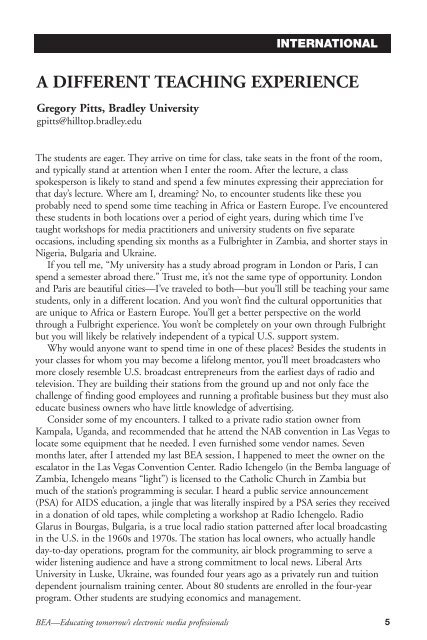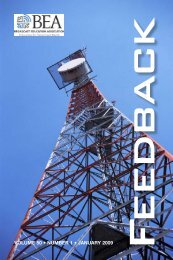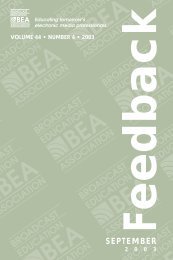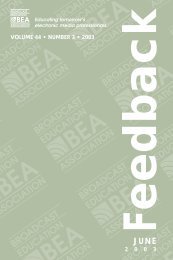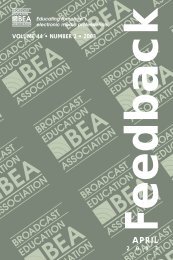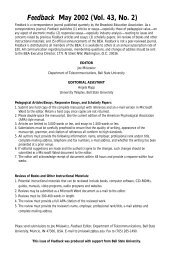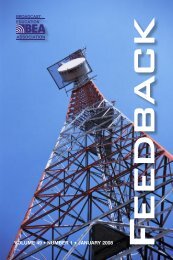his favorite questions for prospective employees is: Who are James Dean, Jimmy Deanand John Dean?Exposing students to this kind of rigor early in the curriculum could inoculate themagainst the disillusionment and burnout so many young broadcast journalists nowsuffer in their first few years on the job. Too many of the best and the brightest give upearly. If they leave school prepared for the tough realities of broadcast news, they mightactually stick it out long enough to develop some expertise and produce stories that domore than scratch the surface.The odds are against them. Today’s students deserve to know how long those oddsreally are.END NOTES1. Portions of this article appeared in the American Journalism Review, July-August,<strong>2002</strong>.2. Dan Rosenheim comments from a panel discussion, University of California atBerkeley, April 24, <strong>2002</strong>, and email exchange, May 28, <strong>2002</strong>.3. Radio industry figures from a conversation with Bob Papper, Ball State University,September 25, <strong>2002</strong>.4. Jim Garrott comment from email exchange, May 1, <strong>2002</strong>.5. Background on KRON-TV from station sources.6. Philip Balboni comments from a telephone interview, May 2, <strong>2002</strong>.7. Al Tompkins formula distributed at a Poynter Institute program, St. Petersburg,Florida, January <strong>2002</strong>.8. “Two is a Party for Owners,” by Brian Lowry, Los Angeles Times, May 11, <strong>2002</strong>.http://events.calendarlive.com/top/1,1419,L-LATimes-TV-X!ArticleDetail-58697,00.html9. “Bahakel Tackles the Doublecast,” by Ken Kerschbaumer, Broadcasting and Cable,July 8, <strong>2002</strong>. http://www.tvinsite.com/broadcastingcable/index.asp?layout=print_page&doc_id=&articleID=CA23219910. Project for Excellence in Journalism TV News research http://www.journalism.org/publ_research/local-tv/2001_magic1.html Tom Rosenstiel, personal conversation,May 10, <strong>2002</strong>.11. RTNDF Excellence in Education reports http://www.rtnda.org/training/excellence02.shtml12. NewsLab’s “Beyond Writing Tests,” http://www.newslab.org/writetest.htm13. Sean Kennedy comment from email, August 19, <strong>2002</strong>.4<strong>Feedback</strong> <strong><strong>No</strong>vember</strong> <strong>2002</strong> (<strong>Vol</strong>. <strong>43</strong>, <strong>No</strong>. 4)
INTERNATIONALA DIFFERENT TEACHING EXPERIENCEGregory Pitts, Bradley Universitygpitts@hilltop.bradley.eduThe students are eager. They arrive on time for class, take seats in the front of the room,and typically stand at attention when I enter the room. After the lecture, a classspokesperson is likely to stand and spend a few minutes expressing their appreciation forthat day’s lecture. Where am I, dreaming? <strong>No</strong>, to encounter students like these youprobably need to spend some time teaching in Africa or Eastern Europe. I’ve encounteredthese students in both locations over a period of eight years, during which time I’vetaught workshops for media practitioners and university students on five separateoccasions, including spending six months as a Fulbrighter in Zambia, and shorter stays inNigeria, Bulgaria and Ukraine.If you tell me, “My university has a study abroad program in London or Paris, I canspend a semester abroad there.” Trust me, it’s not the same type of opportunity. Londonand Paris are beautiful cities—I’ve traveled to both—but you’ll still be teaching your samestudents, only in a different location. And you won’t find the cultural opportunities thatare unique to Africa or Eastern Europe. You’ll get a better perspective on the worldthrough a Fulbright experience. You won’t be completely on your own through Fulbrightbut you will likely be relatively independent of a typical U.S. support system.Why would anyone want to spend time in one of these places? Besides the students inyour classes for whom you may become a lifelong mentor, you’ll meet broadcasters whomore closely resemble U.S. broadcast entrepreneurs from the earliest days of radio andtelevision. They are building their stations from the ground up and not only face thechallenge of finding good employees and running a profitable business but they must alsoeducate business owners who have little knowledge of advertising.Consider some of my encounters. I talked to a private radio station owner fromKampala, Uganda, and recommended that he attend the NAB convention in Las Vegas tolocate some equipment that he needed. I even furnished some vendor names. Sevenmonths later, after I attended my last BEA session, I happened to meet the owner on theescalator in the Las Vegas Convention Center. Radio Ichengelo (in the Bemba language ofZambia, Ichengelo means “light”) is licensed to the Catholic Church in Zambia butmuch of the station’s programming is secular. I heard a public service announcement(PSA) for AIDS education, a jingle that was literally inspired by a PSA series they receivedin a donation of old tapes, while completing a workshop at Radio Ichengelo. RadioGlarus in Bourgas, Bulgaria, is a true local radio station patterned after local broadcastingin the U.S. in the 1960s and 1970s. The station has local owners, who actually handleday-to-day operations, program for the community, air block programming to serve awider listening audience and have a strong commitment to local news. Liberal ArtsUniversity in Luske, Ukraine, was founded four years ago as a privately run and tuitiondependent journalism training center. About 80 students are enrolled in the four-yearprogram. Other students are studying economics and management.BEA—Educating tomorrow’s electronic media professionals 5
- Page 2 and 3: Feedback November 2002 (Vol. 43, No
- Page 4 and 5: CommentSWOT Analysis: Disney Consid
- Page 6 and 7: without adding enough people to do
- Page 10 and 11: The intellectual satisfaction you
- Page 12 and 13: Finding qualitative evidence via te
- Page 14 and 15: 2 Using a two-tailed Pearson Correl
- Page 16 and 17: • We need to expand digital editi
- Page 18 and 19: Two final points: While this paper
- Page 20 and 21: 1. As elsewhere in the profession,
- Page 22 and 23: EvaluationThere will be approximate
- Page 24 and 25: CLASSROOMEMPHASIZING ETHICS: PROMOT
- Page 26 and 27: “Avoiding Plagiarism” ( http://
- Page 28 and 29: CLASSROOMMULTIMEDIA FOR MORTALS: RE
- Page 30 and 31: Video files come in a variety of di
- Page 32 and 33: CURRICULUMDISMANTLING THE SILOS: MO
- Page 34 and 35: the Web on deadline and conceptuali
- Page 36 and 37: CLASSROOMADAPTING DIGITAL LEARNING
- Page 38 and 39: strategies. Unfortunately, most tex
- Page 40 and 41: Figure 2. Good Practice and the Enr
- Page 42 and 43: CLASSROOMSTUDENTS TACKLE SUPER BOWL
- Page 44 and 45: Usually, I urge students to use the
- Page 46 and 47: aggression with intelligence, when
- Page 48 and 49: e lost in sole reporting of undiffe
- Page 50 and 51: COMMENT“SCHOOL DAYS, SCHOOL DAYS,
- Page 52 and 53: CLASSROOMSWOT ANALYSIS: DISNEY CONS
- Page 54 and 55: analysis. SWOT is an acronym for St
- Page 56 and 57: Disneyland ResortDisney Vacation Cl
- Page 58 and 59:
CURRICULUMDON’T ISOLATE E-BUSINES
- Page 60 and 61:
mention implications from legal and
- Page 62 and 63:
viable media alternative to televis
- Page 64 and 65:
management are needed to deliver th
- Page 66 and 67:
Humboldt, Chris (2000). How E-comme
- Page 68 and 69:
editing is a place of influence. St
- Page 70 and 71:
COMMENTYO, YO, YO! THIS IS THE HIP-
- Page 72 and 73:
REVIEWSchroeder, Sheila E. (2002).
- Page 74 and 75:
ANNOUNCEMENTS2003-2004 Scholarship
- Page 76 and 77:
ANNOUNCEMENTSBroadcast Education As
- Page 78:
NEWSJohn Mark DempseyUniversity of


